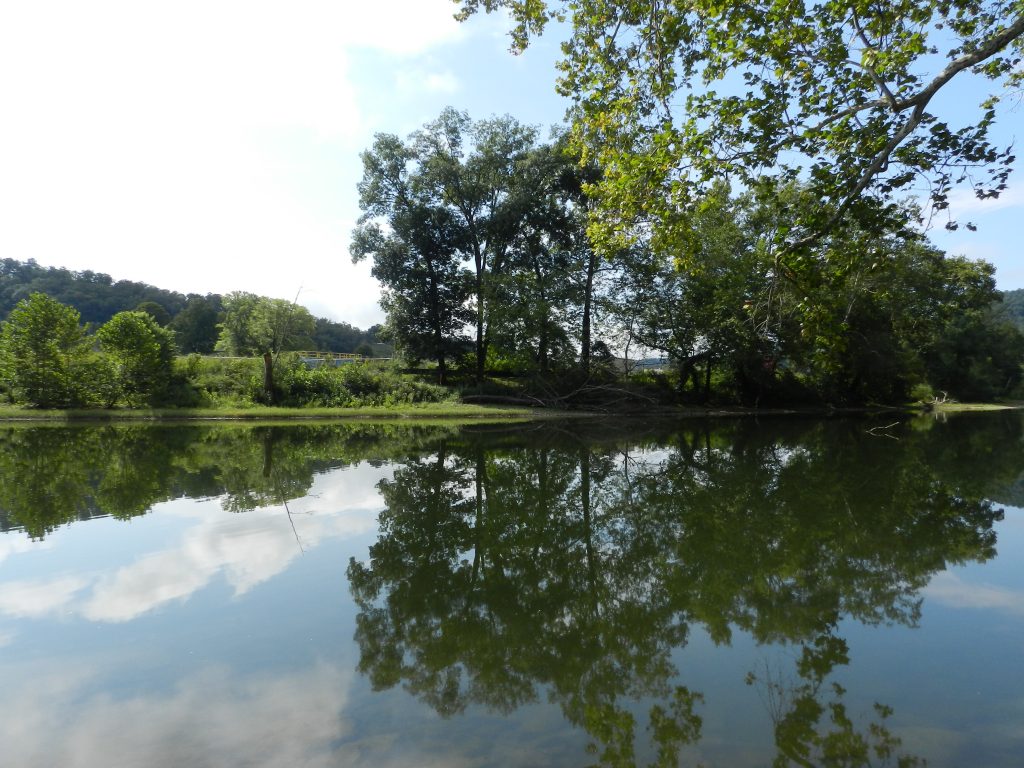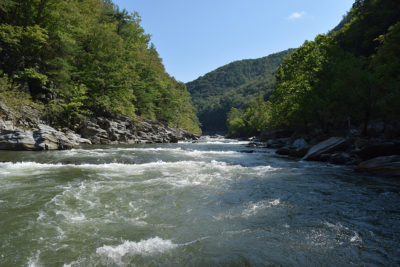
The drill site for a section of the Mountain Valley Pipeline going under the Greenbrier River can just be seen on the opposite side of the river. Photo by Autumn Crowe
Tell lawmakers to defend the Clean Water Act!
Enacted in 1972, the Clean Water Act is the main federal law protecting clean water in the United States. Its importance cannot be understated — the Clean Water Act protects our nation’s streams, lakes and wetlands from pollution including municipal waste, industrial waste, dredged soils, sand, agricultural waste, radioactive materials and more. In the decades since the law was passed, waterways have become safer for fishing, swimming and drinking, and have become better habitats for the aquatic critters we know and love.
The Clean Water Act also includes provisions, including Section 401, that grant states and tribes authority over water quality standards. Section 401 grants states and tribes the authority to certify that certain federally licensed projects, including interstate pipelines and roads, will not violate those standards. In short, the law allows states and tribes to implement stronger water protections than the federal government if they so choose, and can require project developers to modify or reroute their projects or install water protections. In some cases, Section 401 allows states and tribes to reject projects outright if they determine the project will cause too much damage to impacted waterways.
This section of the law has been crucial to protecting waterways in Appalachia from interstate gas pipelines — for example, the North Carolina Department of Environmental Quality denied Mountain Valley Pipeline’s request for a 401 permit multiple times for its proposed Southgate extension. The proposed Constitution Pipeline was famously canceled by developers in the years after New York denied the company’s request for a Clean Water Act certification.
Trump administration weakens state and tribal clean water authority
In 2019, President Donald Trump issued an executive order with the goal of promoting the construction of new energy infrastructure. The order included a directive to the U.S. Environmental Protection Agency requiring the agency to develop new guidance on Section 401 of the Clean Water Act, and to propose new rules. The agency finalized a new rule in 2020.
Among the changes included in that rule, the EPA limited the authority of states and tribes to address pollution from the impacts from the project as a whole — only allowing states and tribes to address the effects from specific “point-source” discharges. Further, the Trump-era rule prevented states and tribes from enforcing water quality protections under state law that are not specifically included under the federal Clean Water Act.
New rule announced Sept. 14

The Nolichucky River flows through a gorge. Photo by Kevin Colburn
The Southern Environmental Law Center applauded the new rule, saying it “is welcome news for communities across America that deserve a seat at the table when federally permitted projects threaten local streams, rivers, lakes and drinking water sources. The rule returns to states and tribes the authority to protect their water resources while providing transparency that will help us build the infrastructure necessary to transition to a green economy. ”
“Clean water is critical to the health and success of our communities,” said North Carolina Gov. Roy Cooper. “This rule will help provide North Carolina with the ability to protect our water quality and strengthen our infrastructure.”
Threats in Congress remain
As members of Congress continue to negotiate over legislation to cut the permitting approval time for energy and infrastructure projects such as transmission lines and pipelines, weakening the Clean Water Act is one of the primary targets of certain lawmakers — particularly those who support the development of more methane gas pipelines.
Several members of Congress have publicly expressed an interest in reducing state and tribal authority over permitting for projects that impact waterways, and they seek to shorten public review periods for those projects. For example, Rep. Garret Graves (R-La.) and Rep. David Rouzer (R – N.C.) are leading H.R. 1152, the “Water Quality Certification and Energy Project Improvement Act,” which would severely weaken Section 401 of the Clean Water Act. The bill passed the House Transportation and Infrastructure Committee in March, but has not yet had a vote on the House floor. However, Graves has been one of the key negotiators on permitting changes in Congress, and continues to make public statements about his intention to weaken the Clean Water Act.
Let’s make it clear that our clean water protections are not up for negotiation. Tell your members of Congress to defend the Clean Water Act!



PLEASE